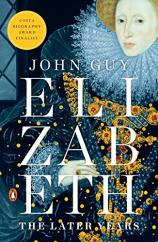Elizabeth: The Later Years
Review
Elizabeth: The Later Years
As I reluctantly closed the cover of John Guy’s ELIZABETH: THE FORGOTTEN YEARS for the second time (portions of this magnificent book demanded a reprise due to “life” getting in the way), two seemingly incongruous figures were stuck in my mind.
First to emerge, quite early in Guy’s richly detailed pages about Britain’s celebrated 16th-century “virgin queen,” was the memory of Charlotte Elizabeth Whitton (1896-1975), the first woman in Canadian history to serve as mayor of a major city. Through two turbulent terms at the helm of Ottawa during the 1950s and ’60s, the staunch social conservative and determinedly single Miss Whitton intentionally modeled her political strategies and personal philosophy after Elizabeth I, whom she admired all her life.
And like the often volatile Elizabeth revealed by Guy, Charlotte was no angel, even if she did fracture a few glass ceilings in her time. She is reputed to have owned one of the largest private libraries anywhere of material written about her heroine. If she’d been alive today, I’m sure the formidable Miss Whitton would have been first in line to snap up this book and devour every word of it with critical expertise.
The second political figure, Fidel Castro (1926-2016), was impossible to ignore, dying just days ago amid heated media debates about whether certain statesmen and women can be conveniently typecast as irredeemably bad, or indisputably good. Such is the extreme all-or-nothing polarization in today’s society that our Canadian Prime Minister, Justin Trudeau, recently drew considerable flak for eulogizing some of the beneficial things Castro had accomplished, even while acknowledging that the iconic Cuban revolutionary-turned-dictator had also made some grievous mistakes.
"This memorable and often poignant encounter with the mature Elizabeth combines the assets and liabilities of an undeniably gifted human being caught in the political vortex created by her notorious father, Henry VIII."
What makes these complicated political figures --- one virtually unknown and the other a household name --- so deeply relevant to this book is how acutely, even uncomfortably, Guy blows apart the triumphant romanticism with which “Good Queen Bess” has so often been portrayed. In movies, historically based fiction, plays, television documentaries and a multitude of popular culture contexts, we encounter a predominantly young, courageous, flirtatious, artistic, eligible and even vulnerable Elizabeth --- often more princess than ruler, even after taking the throne.
While Guy covers the “fairy-tale” segment of her reign with consummate skill and bright, engaging prose, his greatest achievement in this remarkable book begins with the middle stage of her life --- the time when post-menopausal Elizabeth didn’t merely reign at the pleasure of a male establishment that had long wanted her married off to bear a son and future king, but to actually rule. And as a ruling monarch, she was disconcerting, to say the least, a formidable and often tyrannical force.
Through Guy’s exhaustive research into mountains of virtually untouched correspondence and records, we learn the true complexity of a woman who withstood not just one Spanish Armada, but five; made and broke multiple admirers, but resisted sexual intimacy; and described her authority in male princely terms, yet went to extraordinary lengths to maintain sumptuous youthful femininity in her clothing and makeup long after her health and looks had failed.
Far from being the heroic warrior-queen of popular imagery, Elizabeth I actually went to great lengths to extricate her country from the costly and resource-depleting conflicts that plagued Europe during her time. She didn’t benefit from the best available military advice either, and was often burdened with inexperienced commanders, or egocentric adventurers such as Walter Ralegh and the self-absorbed Earl of Essex. Numerous English soldiers sent to fight abroad went unpaid and ignored, returning home impoverished and wounded, forced to riot in the streets to gain some attention to their plight.
The latter years of Elizabeth’s reign were also plagued by economic crises, civil strife and increasing personal woes, both emotional and physical. The queen who had youthfully promised so much to her people grew more and more reclusive as she aged, inevitably losing touch with the difficult realities of her subjects’ daily lives.She was, after all, human --- just like Charlotte Whitton and Fidel Castro, whose idealism and political aspirations resulted in both noble and distasteful outcomes.
In ELIZABETH: THE FORGOTTEN YEARS, Guy does not set out to debunk or discredit the deserved renown of an English monarch who broke with precedent in so many ways. Nor does he try to gloss over the warts and foibles of an individual whose character has been intensified by nuances revealed more clearly and accessibly than ever before.
This memorable and often poignant encounter with the mature Elizabeth combines the assets and liabilities of an undeniably gifted human being caught in the political vortex created by her notorious father, Henry VIII. No woman before or since has commanded such attention or confusion over who she really was. Fortunately, John Guy has succeeded in bringing her into such sharp focus that ELIZABETH: THE FORGOTTEN YEARS deserves to be called “definitive.”
Reviewed by Pauline Finch on December 2, 2016
Elizabeth: The Later Years
- Publication Date: March 7, 2017
- Genres: Biography, History, Nonfiction
- Paperback: 512 pages
- Publisher: Penguin Books
- ISBN-10: 0143110098
- ISBN-13: 9780143110095





